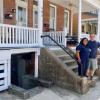All parking meters in downtown Lewes and parking kiosks citywide will likely be replaced before the next meter season begins in May.
What will go in their place is still to be determined.
Parking Enforcement Supervisor Dennis Crawford said he prefers to replace single-space meters with kiosks in most of downtown. There are areas where it would not be possible, he said, but all Second Street meters could be replaced with kiosks. Crawford is also looking to replace the pay-and-display machines at the public parking lots at the beach and downtown.
If the city moves forward with new kiosks in all parking areas, he said, he would like to see a system that does not require a person to display a paper ticket on their dashboard.
“That causes a lot of problems for my guys,” he said. “As soon as someone shuts their door, the wind blows the ticket somewhere in the car. My guys are not allowed to peer in car windows, so they write a citation and then I get a phone call from someone cussing me out because they paid.”
Crawford’s preferred replacement would be a system where someone has to type their vehicle’s license plate number into the kiosk to park. It would also make it easier for enforcement officers to check the status of parked vehicles, he said.
Downtown Parking Committee member Darica Ward said at the group’s Aug. 20 meeting that she likes the idea of kiosks, but wonders if the license plate idea is practical.
“If it’s pay by plate and I’ve got three kids in tow and all my beach gear, and I walk over to that kiosk and I don’t have my plate number, what happens?” she asked.
“You’ll only do that once,” Police Chief Tom Spell responded.
Ward said she supports eliminating the single-space meters, especially since Lewes’ meters only accept coins.
“How many people have $3 worth of quarters in their pocket?” she asked. “I think people are going to love it, personally.”
City Manager Ann Marie Townshend and city staff have been discussing options with several meter and kiosk vendors. She estimates it will cost $120,000 to $150,000.
She said the city can choose to go with kiosks or to upgrade all single-space meters to accept coins and credit cards. Even if officials choose kiosks, the city will need to replace the heads of the eight 30-minute meters and several isolated meters, such as the two at Gilligan’s restaurant.
There is a time crunch for the project, as the modems inside the existing parking kiosks at the beach and downtown parking lots will be obsolete in 2019. Verizon will no longer support the modems and the company is not activating new modems that could be used to replace them.
“So we’re in a position that if a modem goes down, we have meters out of service,” she said. “With the amount of revenue we gain from meters, that is not really an acceptable situation.”
Meters brought in about $436,000 in 2016 and jumped to about $531,000 in 2017.
The city has a similar problem with the single-space meters, which are very old.
“We can’t get the parts to fix them,” Townshend said. “We are able to salvage out of other meters, but at some point we won’t be able to do that either.”
Deputy Mayor Fred Beaufait said the demographics of the town’s residents and visitors inclines him toward single-space meters. He also doesn’t like the look of kiosks.
“I personally like the single-head meters because I think it adds some quaintness to the town,” he said. “If we did away with them, we’d have to take up the poles, replace the bricks and a number of things. I question [adding kiosks] downtown with the limited space and population we have. I think the single-head meters are better than these machines.”
Mayor Ted Becker said city council voted in 2006 to go with single-space meters downtown rather than kiosks. One of the factors in the vote, he said, was aesthetics.
“But things have changed a lot since then,” he added.




















































